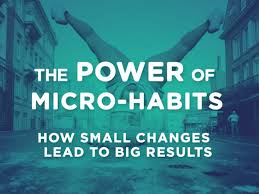The Power of Micro-Habits: Small Changes That Lead to Big Success

Success is often thought of as the result of monumental efforts, bold decisions, or life-changing events. While these moments can certainly play a role, they are rarely sustainable on their own. True success is more often built on the foundation of small, consistent actions—what we call micro-habits.
Micro-habits are tiny, easily achievable actions that, over time, lead to transformative results. These incremental changes are powerful because they compound, requiring minimal effort upfront while producing lasting impact.
This article explores how micro-habits can reshape your life and provide actionable tips for incorporating them into your daily routine.
Why Micro-Habits Work
- Low Effort, High Consistency: Unlike massive lifestyle overhauls, micro-habits are easy to implement and maintain. Their simplicity eliminates the common barriers to change, such as overwhelm or procrastination.
- Compound Effect: Small actions performed consistently lead to exponential growth over time. A single step may feel insignificant, but when repeated daily, it creates momentum.
- Behavioral Anchoring: Micro-habits are easy to attach to existing routines, making them more likely to stick. For example, adding a 30-second stretch after brushing your teeth helps anchor the habit to an established behavior.
- Boosts Confidence: Achieving small wins creates a sense of accomplishment, which motivates you to continue progressing.
The Science Behind Micro-Habits
Psychological research highlights that small, repetitive behaviors are more effective in creating long-term change than dramatic efforts. The brain thrives on repetition and rewards, meaning micro-habits are more likely to become automatic.
For instance, BJ Fogg, a behavioral scientist at Stanford University, developed the Tiny Habits Method, which emphasizes starting small. His research found that habits are easier to adopt when they are simple, tied to a trigger, and celebrated.
Examples of Micro-Habits That Lead to Big Success
1. Health and Fitness
- Drink a glass of water first thing in the morning to hydrate and boost metabolism.
- Do one push-up per day, then gradually increase as your strength improves.
- Stand up and stretch for 30 seconds every hour to combat the effects of sitting for long periods.
2. Productivity
- Write down your top three priorities every morning to maintain focus throughout the day.
- Spend two minutes tidying your workspace before starting work to enhance concentration.
- Check emails only at designated times to avoid constant distractions.
3. Personal Growth
- Read one page of a book daily, and you’ll complete multiple books by the end of the year.
- Write down one thing you’re grateful for every night to cultivate a positive mindset.
- Spend five minutes journaling to reflect on your thoughts and emotions.
4. Relationships
- Send a quick text or voice note to a loved one daily to strengthen connections.
- Practice active listening for one minute during conversations to show genuine interest.
- Express one compliment or word of appreciation daily to nurture positive relationships.
5. Finances
- Save $1 a day, and watch your savings grow over time.
- Review your spending for one minute daily to identify unnecessary expenses.
- Set up automated transfers to savings accounts to build financial security effortlessly.
How to Start Building Micro-Habits
- Start Small
Begin with habits that are so easy they feel almost insignificant. For instance, floss one tooth instead of committing to flossing your entire mouth. The key is to reduce resistance to starting. - Anchor to Existing Routines
Tie your micro-habit to an established habit. For example, after brewing your morning coffee, spend one minute meditating. This anchoring helps integrate the habit seamlessly into your day. - Focus on Consistency, Not Perfection
The goal is to build momentum, not to be perfect. Missing a day isn’t failure—it’s an opportunity to reset and continue. - Celebrate Small Wins
Each time you complete your habit, celebrate! A simple smile, fist pump, or mental acknowledgment reinforces the behavior and encourages repetition. - Track Your Progress
Use a habit tracker or journal to monitor your efforts. Seeing your progress visually can be highly motivating.
The Compound Effect of Micro-Habits
The beauty of micro-habits lies in their cumulative power. For example:
- Health: Drinking one extra glass of water daily might seem minor, but over time, it improves hydration, skin health, and energy levels.
- Finance: Saving $2 daily adds up to $730 a year, not counting interest or investment growth.
- Knowledge: Reading just one page daily means finishing a 300-page book in less than a year.
These seemingly small actions ripple out, creating significant and often surprising changes.
Overcoming Challenges with Micro-Habits
- Lack of Time: Micro-habits take mere seconds or minutes, making them manageable even in the busiest schedules.
- Forgetting: Use reminders like sticky notes, alarms, or habit-tracking apps to stay on track.
- Losing Motivation: Focus on the process, not immediate results. Remember, the goal is consistency over time.
Real-Life Success Stories
- James Clear, the author of Atomic Habits, emphasizes how small habits helped him overcome injuries and become a bestselling author. His motto: “Success is the product of daily habits—not once-in-a-lifetime transformations.”
- Serena Williams, one of the greatest athletes, credits her consistent micro-habits, such as focused practice sessions and disciplined routines, for her long-term success.
Conclusion
Big changes don’t happen overnight—they are the result of small, consistent actions repeated over time. Micro-habits may seem trivial, but their power lies in their ability to compound and transform your life in meaningful ways.
Start small, be consistent, and watch as these tiny changes lead to big success. The best time to begin is now—what small step will you take today?



